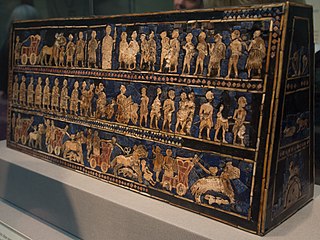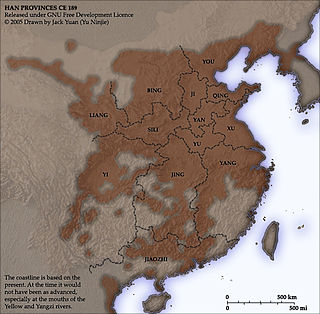Middle Kingdom may refer to:
Middle Kingdom may refer to:

The Bronze Age was a historical period characterised principally by the use of bronze tools and the development of complex urban societies, as well as the adoption of writing in some areas. The Bronze Age is the middle principal period of the three-age system, following the Stone Age and preceding the Iron Age. Conceived as a global era, the Bronze Age follows the Neolithic, with a transition period between the two known as the Chalcolithic. The final decades of the Bronze Age in the Mediterranean basin are often characterised as a period of widespread societal collapse known as the Late Bronze Age collapse, although its severity and scope are debated among scholars.

The 2nd millennium BC spanned the years 2000 BC to 1001 BC. In the Ancient Near East, it marks the transition from the Middle to the Late Bronze Age. The Ancient Near Eastern cultures are well within the historical era: The first half of the millennium is dominated by the Middle Kingdom of Egypt and Babylonia. The alphabet develops. At the center of the millennium, a new order emerges with Mycenaean Greek dominance of the Aegean and the rise of the Hittite Empire. The end of the millennium sees the Bronze Age collapse and the transition to the Iron Age.

Ancient history is a time period from the beginning of writing and recorded human history through late antiquity. The span of recorded history is roughly 5,000 years, beginning with the development of Sumerian cuneiform script. Ancient history covers all continents inhabited by humans in the period 3000 BC – AD 500, ending with the expansion of Islam in late antiquity. The three-age system periodises ancient history into the Stone Age, the Bronze Age, and the Iron Age, with recorded history generally considered to begin with the Bronze Age. The start and end of the three ages vary between world regions. In many regions the Bronze Age is generally considered to begin a few centuries prior to 3000 BC, while the end of the Iron Age varies from the early first millennium BC in some regions to the late first millennium AD in others.
Qin may refer to:
Han may refer to:
Chu or CHU may refer to:

Xing is a Chinese surname. There are two hypothesized sources for the extant catalogue of surnames:

Fei is a traditional Chinese surname. It was 65th in the Hundred Family Surnames.

You Prefecture or YouProvince, also known by its Chinese name Youzhou, was a prefecture (zhou) in northern China during its imperial era.
Yu is the pinyin romanisation of several Chinese family names. However, in the Wade–Giles romanisation system, Yu is equivalent to You in pinyin. "Yu" may represent many different Chinese characters, including 余, 于, 由, 魚 (鱼), 漁(渔), 楀, 俞(兪), 喻, 於, 遇, 虞, 郁, 尉, 禹, 游, 尤, 庾, 娛(娱), and 茹 (Rú).

Wei (魏) is the English spelling of a Chinese surname.

Meng is a Chinese surname. Meng is a shi surname or clan name (氏), as opposed to the xing (姓) category of surname, ancestral name. Meng is of the type of surname which was a member of the list of names denoting seniority within a certain family: in ancient usage, the characters of meng (孟), zhong (仲), shu (叔) and ji (季) were used to denote the first, second, third and fourth eldest sons in a family. These were sometimes adopted as surnames. Of these, Meng is the best known, being the surname of the philosopher Mencius. It is the 94th name on the Hundred Family Surnames poem.

Xiong is the pinyin romanization of the Chinese surname 熊 (Xióng). It is 41st in the Hundred Family Surnames, contained in the verse 熊紀舒屈.
Lian/Lien, is a Chinese surname.
Fu is an ancient Han Chinese surname of imperial origin which is at least 4,000 years old. The great-great-great-grandson of the Yellow Emperor, Dayou, bestowed this surname to his son Fu Yi and his descendants. Dayou is the eldest son of Danzhu and grandson of Emperor Yao.
Bao or Pao is the pinyin romanization of two Chinese surnames, 包 and 鮑/鲍. It could also be a sinification of the Mongolian surname Borjigin. It is also a Vietnamese surname.
Mu is the pinyin romanization of several Chinese surnames.
Bǔ (卜) is a Chinese surname. It is the 210th most common Chinese surname, being shared by 510,000 or 0.038% of the population, with Jiangsu being the province with the most people. It is the 92nd name on the Hundred Family Surnames poem.